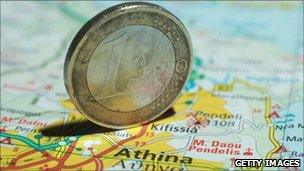Spain PM postpones holiday as debt fears hit record
- Published

The recent bailout deal for Greece agreed by the eurozone has not calmed all of investors' fears
Spain's Prime Minister Jose Luis Zapatero has been forced to postpone his holiday as investors continue to flee his country's debt.
Mr Zapatero had been due to leave for south-west Spain.
But on Tuesday, the yield on Spanish bonds reached 4.04 percentage points more than German debt - a record since the euro was introduced in 1999.
The so-called premium to hold Italy's debt also hit a record.
"The prime minister has postponed the start of his holidays," Mr Zapatero's spokesperson said. "He is keeping an eye on the international economic situation."
The latest spike in yields comes at a bad time for the Spanish government, which plans to raise as much as 3.5bn euros ($5bn, £3.1bn) in a bond auction on Thursday.
On Tuesday, the euro reached a record low against the Swiss franc. The Swiss currency is usually considered a so-called safe haven in times of turmoil.
Meanwhile, Spain's main stock index fell for the second day in a row, closing down 2.2% after tumbling 3.2% a day earlier. Italy's index fell 2.5%.
Higher costs
Despite another bailout for Greece last month, the eurozone is struggling to contain fears that more countries will not be able to repay their enormous debts.
The Irish Republic and Portugal have both been bailed out, and Greece has been rescued twice. Now there are concerns about the economic health of Cyprus.
As the bond yields rise, Italy and Spain have seen their borrowing costs rise sharply in recent weeks.
Italy's 10-year bonds rose above 6% on Tuesday - a rate considered unsustainable.
The premium over the equivalent German debt also reached a record spread of 3.74 percentage points.
Italy has the largest sovereign debt of any European country.
As a percentage of output, Italy's debt is second only to Greece in the eurozone - whose huge debts have led to two bailouts.
Representatives from the Italian central bank and stock regulator Consob were set to hold discussions on "the sovereign debt market situation and implications for the banks and the economy".
As their countries' bond yields rise, it becomes more expensive for governments to sell more debt, which leads to a vicious circle as the old debt comes due for repayment.
On Tuesday, Germany - the biggest economy in Europe - saw its bond yield drop below the inflation rate for first time since reunification.
This suggests that investors are now so scared, they are willing to sacrifice a return on their investment to hold the least risky bonds in Europe.